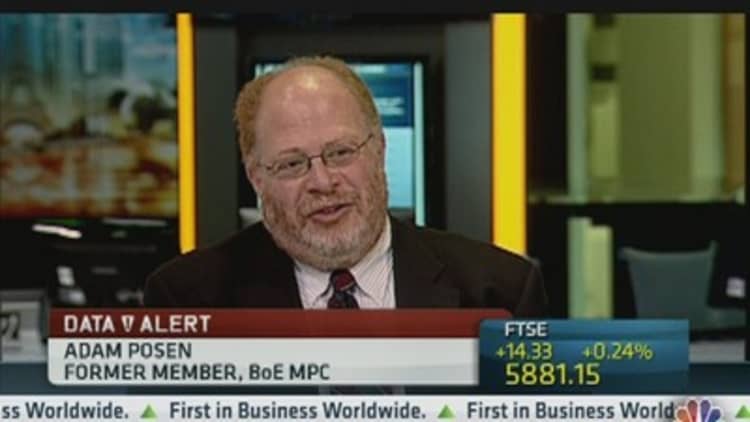The British Chancellor George Osborne said on Sunday that it would be "catastrophic" to reverse his in the U.K.,but Adam Posen, a former member of the Bank of England's Monetary Policy Committee, told CNBC that both Osborne's austerity package - and apocalyptic warnings - were self-defeating.
"When finance ministers say there's a 'catastrophe' around the corner, there usually isn't and saying that usually makes things worse," Posen told CNBC, adding that the Chancellor's policy of austerity is as damaging as his rhetoric.
"The tactics that [the Chancellor and Conservative party] are taking are demonstrably slowing growth and slowing revenues," Posen told CNBC's "Worldwide Exchange" on Monday."And so the extent of austerity and the form of austerity that they're taking is self-defeating."
Posen, who is now a senior Fellow at the Peterson Institute for International Economics, said that the was missing as the tax strategy and spending strategy was "incoherent" –exemplified by the government cutting spending on investment while increasing it on welfare.
"In the end, growth is only so good in so far as you'repaying for the right things and cutting the right things…If you wanted to do tax cuts to stimulate the economy why aren't we doing investment tax credits in the U.K? They've been on the table forever."
Posen added that investment tax credits – tax incentives that enable companies to deduct a specified percentage of certain investment costs from their tax liability – had precedence in the U.S. and U.K.and were business-friendly. They could also be a part of a coherent growth strategy so far lacking in the U.K., Posen said.
"A growth strategy is recognizing that the U.K has had an enormous shortfall of business investment…it existed in the boom years and has got worse since 2008…So,we need to think about what is going to get business investing."
"Obviously,the austerity program and the government sticking to it for the last four years has not led to a bonanza in business investment."
Despite the criticism of austerity measures over the last four years - in which the country has experienced two recessions and only recently posted better than expected gross domestic product data - the U.K. joined China and the euro zone in revealing better-than-expected manufacturing data on Monday.
British manufacturing activity shrank much less than expected in November, according to the Markit/CIPS purchasing managers' index (PMI) which showed manufacturing sector rose to 49.1 from October's revised 47.3 and beating the median expectation of 48.0 forecast by economists polled by Reuters.
The data could give a boost to Chancellor George Osborne who will present an update on his budgetary plans to parliament on Wednesday. Addressing the U.K.parliament in London, in what's known as the "Autumn statement,"

Posen's Prediction
Posen told CNBC that, after Bank of England stimulus measures such as quantitative easing (QE) and record-low interest rates – he had little hopes of constructive action from the central bank.
"Projecting forward I think…At the margin they may do a little more QE if there's bad news but they're not going to take the steps they need to do which would be buying non-government bond assets or it could be to use their new powers to put more competition into the banking sector."
"They're not going to do that," Posen said, adding that he was disappointed by the direction of the bank's policy.
"It's not [only] what's happening on the fiscal side, I think a lot of my former colleagues have talked themselves into this policy defeatism that QE doesn't work or it hasn't worked or that most of the slow growth has to be structural, I think they're wrong but that's where they're at."


